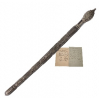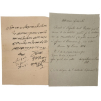Silver, cylindrical body, the handle richly decorated with beads of different size, filigrée work and silver bands; turban-shaped head of elongated, ovoidal form, decorated with stylized rosettes, beads, filigrée and engravings; on top a small sphere, resting on a stylized flower; a safety catch allows to extract a concealed, double-edged blade, transforming this insignia of power and command, into a weapon for immediate defense or close-combat. The lower part of the baton, decorated with Ali-Pasha`s typipcal unique hat, depicted on all his personal objects, see all paintings and drawings from the period.
A beautiful, most rare piece, inspired by the ottoman “Topuz” or war mace, here made in the typical Albanian/Balcanic taste, by a skilled silver- and swordsmith, excellent condition, together with credit (for 100 Piastres) and appointment document and it`s French translation to Athanasi Lidorichi, as Ordinance Officer dated 29th February 1814 in Prevesa.
This piece, to be considered the Command Baton Ali Pasha, remained by descent in the property of a noble family whose ancestors arrive to the legendary Albanian Leader.
Ali Pasha Tepelene of Ioannina (1740-1822), had a life strictly connected to the complicate history of the Balkans during the Ottoman rule. Firstly an infamous bandit, thanks to his skills and brilliant mind acquired the trust of the Ottomans, rising to even higher ranks in the administration, until becoming the ruler of the balcanic region of the Ottoman Empire: he used both brutality and an intelligent opening to modern ideas acquired by the acquaintance with European travelers and men of culture, one of them Lord Byron. His political downfall began in 1819, when The Ottoman Court feared Ali Pasha’s increasing power in the Balkans and soon a struggle began, being almost an internal war. Eventually, during a truce between the troops sent by the Sultan and those of Ali Pasha, at a meeting with the chief of his opponents, he was fatally wounded and the beheaded; the head, presented to Hurshid Pasha, who respectfully bowed to it and kissed the beard. Ali Pasha is still considered one of the forerunners of Albanian independence.
Dim.: full-length 50,5 cm.; the blade, 18,3 cm.
Provenance: Previously owned by the late Dr. Zia Sofu (1918-94).
Mustafa Zia Sofu, son of the painter Fatma Melek Sofu (1896-1976) and Sefik Bey (d. 1946), was the last descendant of Ali Pasha of Yanina. (1741-1822), the infamous ruler of the Ottoman province of Yanina in Northern Greece. He studied law but never practiced, and by the 1970s, he had moved to London. From there, he divided his time each year between homes in Paris, Switzerland, and Istanbul. His mother in particular had significant aesthetic and intellectual interests, and he grew to be an expert on and collector of Ottoman artwork. He also had a deep interest in Ottoman manuscripts and calligraphy.
The unique and historically important baton with concealed blade, belonged to Ali Pasha Tepelena of Ioannina
SKU:
421
Auction has finished.
Total bids:
12
ALBANIA
Shop ID:
DN1





